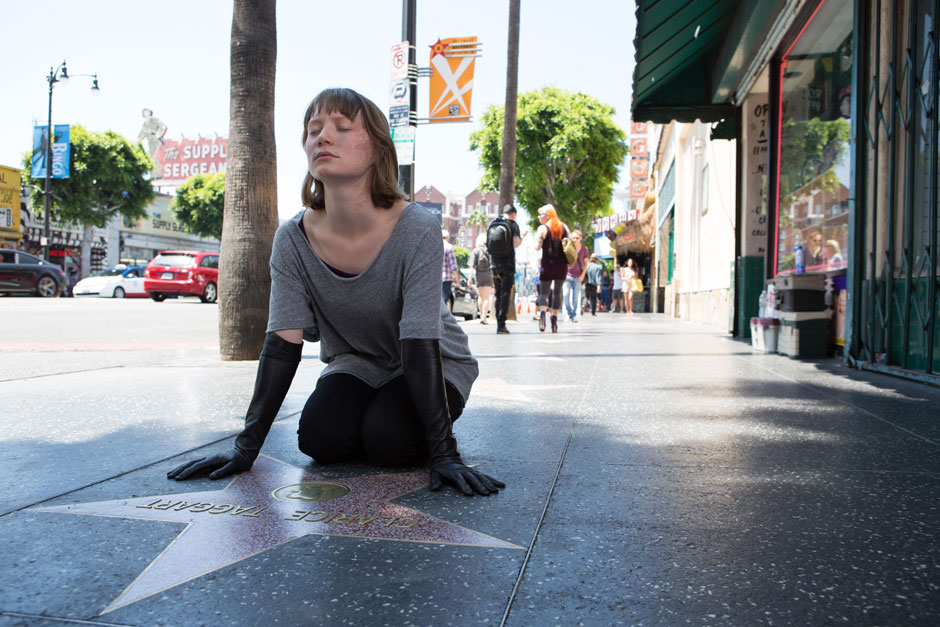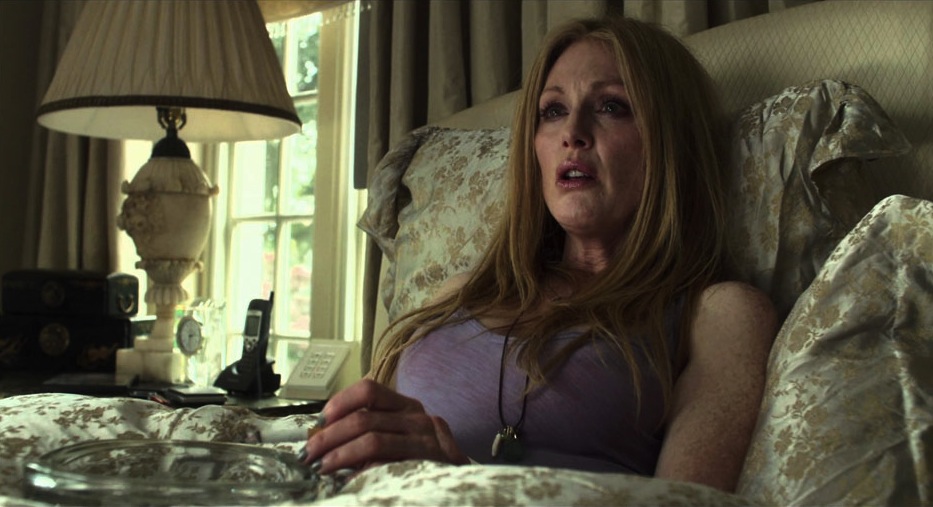Part of what’s exciting about Maps to the Stars, David Cronenberg and Bruce Wagner’s new film about Los Angeles, is the inventiveness and ease with which it stakes out a dark corner of territory under the bright California sun. It’s Hollywood hell, populated by suffering souls: comic, sad, frightening characters, who are believable, more than slightly weird, and all, it turns out, connected.
The first person we meet is the waiflike Agatha Weiss (Mia Wasikowska), whose unusual fashion accessories (long black gloves, opaque stockings) have been chosen to hide the burn scars covering much of her body. Agatha gets a job as the personal assistant—“chore whore”—to Havana Segrand (Julianne Moore) an actress who dreams of resuscitating her career by “re-imagining” the role played years ago by her famous mother: the lovely Clarice Taggart (Sarah Gadon). Clarice died in a fire, and her ghost keeps appearing to further destabilize her fragile daughter. Havana is in some sort of massage-and-gibberish therapy with Stafford Weiss, a celebrity self-help guru (John Cusack) whose son Benjie has been turned by money, fame, and drugs into the human child-star version of the mad puppet Chucky. Benjie and his friends hang out in clubs where their presence is probably illegal; they joke about orderlies raping nursing home residents and they refer to every woman over the age of twenty as practically dead.
Even Benjie and his odious friends give us scenes which reveal the precision and honesty of Cronenberg and Wagner’s observation. There’s a moment when the kids are slinging around words like menopausal, and the girls are trying to prove they’re as tough as the boys. The girls take things a little too far; the sexual suggestiveness of their conversation becomes so outrageous—and gross—that Benjie looks uneasily at his friend, who says to them, “C’mon, you guys. Chill.”
What also makes the film work is its allergy to cliché. We’ve seen great movies about Hollywood—Altman’s The Player, David Lynch’s Mulholland Drive. And it’s been more than a half-century since Billy Wilder’s Sunset Boulevard set a very high bar for films about an aging actress. But while Maps to the Stars has scenes at the Chateau Marmont, where Sofia Coppola’s Somewhere treated us to a long stay, and on Rodeo Drive, where the memorable shopping scene in Pretty Woman unfolded, there is nothing borrowed or stale about what it depicts.
As collaborators, David Cronenberg and Bruce Wagner seem naturally suited; they share a rare ability to combine bleakness with humor. Cronenberg has always excelled at projecting our private terrors (fear of physical decay, fear of soul theft) onto the giant screen, and in seeding new paranoias that might not have occurred to us, on our own: fear of the rogue gynecologist, fear of being assaulted by Russian gangsters in a sauna.
Maps to the Stars exacerbates whatever anxieties we may have had about Los Angeles, some of which may have been planted by Bruce Wagner’s searing, funny novels, among them Force Majeure (1991), I’m Losing You (1996), and Still Holding (2003). His books plumb a Hollywood stocked with bottom-feeding celebrity look-alikes, and an exterminator who fishes dead raccoons out of the swimming pools of the stars. To say that Wagner deglamorizes the movie business is like saying that Upton Sinclair de-glamorized the meat-packing industry, and the medium of film allows Wagner to make his audience visualize (instead of merely imagine) the hallucinations that plague his characters.
Cronenberg and Wagner make us believe Havana is seeing her dead mother. This also depends on the gifted Julianne Moore, a brave performer here playing what must be every actress’s worst nightmare: age-mandated unemployment. It takes nerve to let her beautiful face (as she did in Paul Thomas Anderson’s Magnolia) quiver and melt into a pool of misery and desperation you want to look away from.
Evan Bird delivers a likewise courageous performance as Benjie, fresh out of rehab and appearing in a sequel to the hit film Bad Babysitter. Benjie may vomit from self-loathing after a meeting with studio executives, but while it’s happening, he and his mother (Olivia Williams) are a power couple: Lady Macbeth and Bad-Babysitter Macbeth. Benny’s outbursts are indulged, even expected by his bosses. When he describes the $300,000 a week he was earning at the age of nine as “psychotic,” an executive commiserates, “That kind of income would fuck up Mother Theresa.” Benjie replies, “She’s already fucked, she’s dead, that’s how fucked up she is.”
Only slowly does the film let us see the vulnerability tamped down deep inside Benjie. As a publicity stunt, he visits a hospitalized fan named Cammy whose dire prognosis is legible in her pallor. The scene is expertly played, with just the right note of preteen-girl star crush and preteen-boy boasting and genuine discomfort. Benjie asks how Cammy got AIDS, except that she doesn’t have AIDS, she has Non-Hodgkins Lyphoma. Sorry! Benjie shoots his publicist a poisonous look. He should have been prepped! After leaving Cammy, he tears into the guy with a rant that goes from brutal stupidity (“Non-Hodgkins? What the fuck does that mean? Either it is, or it isn’t!”) to the final insult, “Jew faggot.”
Advertisement
Given the familiar Hollywood setting in which all this unfolds, it is hard not to think about other Hollywood films as you watch it. But the director who comes to mind most often is Fellini. Maps to the Stars could be Juliet of the Spirits relocated to Beverly Hills, a less hospitable and forgiving place than the lovely Italian house built on a lot in Cinecittà. The gravelly prophetic voices of the sibyls who advise and hector Juliet here come from the mouths of seasoned West Coast talent agents.
Somewhat rarely among directors, Cronenberg believes that actors are capable of speaking in long strings of complete sentences, without losing the audience or impeding the plot. Here too he is well matched with Wagner, whose narratives are at once fast-paced and literary, replete with allusions to poetry and canonical fiction. In Still Holding, a sleazy producer decides to make a film based on Gogol’s Dead Souls, “the perfect zeitgeist melodrama, a work of high, elegiac art that wouldn’t be afraid to make money, the frisson being that Gogol was public domain. The rights wouldn’t cost dime one.”
Viewers who miss the bookish sources Cronenberg and Wagner refer to in Maps to the Stars will still admire how its allusive passages deepen its mysteriousness. In the film, nearly everyone quotes Paul Éluard, a poem entitled “Liberty”:
On all the flesh that says yes
On the foreheads of my friends
On every hand held out
I write your nameOn my school notebook
On my desk and in the trees
On the sand in the snow
I write your name
Offhand I can’t think of another satiric, entertaining, beautifully photographed film about Hollywood, a rapturous fantasy of shelter-magazine real estate, move stars, tropical vegetation, dark secrets, child actors, bogus gurus, and limos—that also makes us aware of how differently a French surrealist poem sounds when recited by different people.
Spoken by Clarice in a scene from the film that made her career and that Havana watches, in bed and in tears, the poem (framed as an ardent declaration of love) recalls the slightly cheesy use of Wordsworth as a hymn to teenage sex in Splendor in the Grass (1961), starring Natalie Wood and Warren Beatty. When Cammy’s ghost recites a verse, it’s the plaintive plea of the dead not wanting to let go of the living. When Agatha sings it to her stash of pills, it’s a hymn to the comforts of drugs; and when she chants it, kneeling over the gold star with Clarice Taggart’s name set in the Hollywood pavement, it’s an incantation meant to raise a spirit from the hell of a world without narcotics.
Cronenberg and Wagner have given us a vision that not only lingers in the memory but that may forever modify my experience of Los Angeles. I can’t imagine going to Southern California without some angle of light, a house, a street, a palm tree, reminding me of the film. Like the ghosts who haunt the movie, the Benjies and the Havanas and their chore whores and handlers and friends will appear when I least expect them, reciting Éluard in the back of their limos, stalled on the Hollywood Freeway.
Maps to the Stars will be released on DVD and Blu-ray on April 14, and is playing at the IFC Center in New York through April 9.




